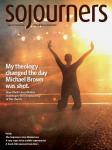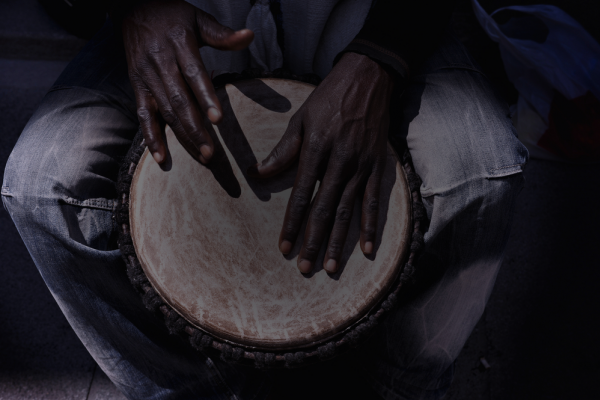THE LECTIONARY PASSAGES for these weeks of Pentecost make the season come alive. Why? Because who doesn’t light up at receiving gifts? We humans are pretty good at giving gifts—Christmas, birthdays, graduations. Yet our giving pales in comparison to that of the Holy Spirit. Usually we give because we expect something in return. The Holy Spirit gives freely and abundantly out of unending love and grace. These scriptures tell of the Holy Spirit giving us all we will need to lead God’s people: happiness, tongues, humility, and boldness. And yet we’ll also get more than we need: The Holy Spirit both gives and empowers.
For the work ahead, we will certainly need a power that goes beyond ourselves—unless we are satisfied with half-baked sermons, timid leadership, and time-bound visions. In case this sounds like your grandmother’s preacher on the “fruits of the spirit,” remember that the Spirit put on display in these verses is the prophetic, justice-loving, reconciliation-seeking third person of the Trinity who anointed Jesus with his mission. His was a mission “to bring good news to the poor ... to proclaim release to the captives and recovery of sight to the blind, to let the oppressed go free, to proclaim the year of the Lord’s favor” (Luke 4:18b-19). What a politically theological imagination, capable of transforming the world! It’s the same one the Holy Spirit gives to us today through the church for the world. That’s a gift worth dying for. Holy Spirit come, come quickly!
[ September 6 ]
Love Among the Free
Proverbs 22:1-2, 8-9, 22-23; Psalm 146:1-9; James 2:1-17; Mark 7:24-37
THOSE WHO PORTRAY justice-seeking as a vocation of “grit and bear it” must have missed the Hebrew Bible. That we are to work for justice is dogma. The disposition in which we do it is another matter. Our readings from Proverbs and the psalm leave no room for misunderstanding: happy are those that seek justice (Proverbs 22:9; Psalm 146:5-7). Yet the work of justice to which we are called is fraught with complexity and misunderstanding. We work with people and as people, after all, not just as systems and principalities. People! This means that despite our justice-loving selves, the systems of injustice and exclusion we fight so hard to dismantle “out there” find their way inside of us. To resist this, the finely dressed must do the serving; the guy with the odor and hole in his sneakers must be the one to receive. Scripture calls our propensity for basing our identities on social distinctions for what it is: “evil” (James 2:4). The example of the Syrophoenician woman stands out. That she claims the racial slur of “dog” for herself shows that, even in the presence of Jesus, her internalized racism persists (Mark 7:27-28).
How do we make sense out of these distinctions since God is indeed “the maker of ... all” (Proverbs 22:2b)? It’s enough to squelch anyone’s joy. Howard Thurman writes in Jesus and the Disinherited: “an attack [must be] made on the enemy [or privileged] status and the individual [must emerge], the underprivileged ... must [also] be status free ... in either case love is possible only between two freed spirits.” The attack must be made on the type of “contact without fellowship” that often determines our relationships as we seek justice. Jesus must be in the middle. Dietrich Bonhoeffer calls this relating to others through Jesus Christ. Being in Jesus’ presence isn’t enough. We’ll need an intimacy with Jesus that touches us in the places necessary to see and experience ourselves and others truly, freely (see Mark 7:32-35). Intimate love and freedom are the ingredients for happiness. We’ll need action and happiness to keep our faith truly alive (see James 2:14-17)!
[ September 13 ]
Words Are Political
Proverbs 1:20-33; Psalm 116:1-9; James 3:1-12; Mark 8:27-38
THEOLOGIAN Stanley Hauerwas once said, “You can only act in the world you can see and you can only see by learning to say.” Words are political. Language is ethics. We learn from a young age that “your mouth can get you in trouble.” I can still recall the taste of Ivory soap after getting my mouth washed out! The author of James tells us in no uncertain terms that the tongue is compared to an untamed fire, from it comes blessings and curses (James 3:8-9). Peter puts this on display (Mark 8:27-38). Out of the same mouth that Peter proclaims Jesus as Messiah, Peter rebukes Jesus’ foretelling his own death. The irony of Peter’s misunderstanding is deafening. Jesus hears it too and names Satan as the only source from which such audacious chatter could emerge.
Jesus quickly links Peter’s words to discipleship and so to our words also. What we speak from our mouths enacts the type of lives we will live. We will “eat the fruit” of our lips (Proverbs 1:31a). That could be a foolish life full of death, loss, and division (Proverbs 1:23-32). Jesus says the only life worth living is one that takes up the cross and follows him. Lest we think that this cruciform following only applies to actions, Jesus says: “Those who are ashamed of me and of my words, of them the Son of Man will be ashamed when he comes in his glory” (Luke 9:26). So we’ll need to learn to follow Jesus’ actions and his words. We’ll need to learn to speak anew. Not to worry, though; God promises to give us God’s words (Proverbs 1:23b). They are words that lead to a wise life, one that overcomes death, tears, and stumbling (Psalm 116:8-9). And God has plenty of words to go around; Pentecostal speech pours out freely so that all might know God’s life and love. Finally, speaking these words isn’t really enough; they deserve a song, as Charles Wesley reminds: “O for a thousand tongues to sing my great Redeemer’s praise.”
[ September 20 ]
‘I Must Be First’
Proverbs 31:10-31; Psalm 54; James 3:13 - 4:3, 7-8a; Mark 9:30-37
A 2015 PEW survey on religious patterns in America has leaders from various backgrounds and denominations offering conflicting interpretations for the causes of the “decline” in religious participation and proposing strategies for future growth. Could this be our contemporary form of arguing over “who is the greatest?” (Mark 9:33-34). Martin Luther King Jr. called this impulse for greatness the “drum major instinct.” He reminded us that each one of us has it—and the church has it too. King’s critique of this impulse in terms of nationalism must now be turned toward the church itself. The church is saying: “I must be first. I must be supreme. Our [church] must rule the world.” Like the empires of old, God will “break the backbone” of the church’s power if we don’t stop our recklessness, our covetousness for what is big and mighty, our disputes over security, our boasting over responsibility—and our defensiveness over the lack thereof.
This is not the wisdom from God but something “earthly, unspiritual, devilish” (James 3:15b). Rather than strategy, submission is in order, single-mindedness is required, resisting evil is incumbent; only repenting and returning to God will save us.
This returning is none other than Jesus calling his church, like Jesus called the disciples, into an intimate place, away from the trappings, to gently remind us: “Whoever wants to be first must be last of all and servant of all” (Mark 9:35). Yet we fail to understand that to be last and a servant in Jesus’ economy is to die, to take up a cross, to be lowly, little, and least (Mark 9:32-36). Since the church has not come to fully understand this, we are not truly capable of asking for what we need: deliverance, exoneration, and resurrection! This is a power altogether different from the distortions of the drum major instinct. God is asking the church to be “a capable wife” (Proverbs 31:10-31). I pray the church responds “I am she,” in order to receive the Spirit’s empowerment to be, in the cadence of Dr. King, a drum major for love, for moral excellence, for generosity, for justice, for peace, for righteousness (James 3:17).
[ September 27 ]
Our Esther Moments
Esther 7:1-6, 9-10, 9:20-22; Psalm 19:7-14; James 5:13-20; Mark 9:38-50
THE DISCIPLES ARE still stuck on the question of who’s the greatest. They’ve pitched a fit over other Christians with whom they disagree (see Mark 9:38). Jesus isn’t as nice and safe this time. He says there’s room for anyone who claims—and is not against—his name and people, even if they don’t follow a particular group (Mark 9:39-41). This is a prescient word for our time with endless talk of schisms within Christian fellowships over all sorts of matters, from homosexuality to the “nones.” However, these matters don’t center on the essentials that Jesus names as non-negotiables. Jesus ties our tendencies to sectarianism with causing those young in the faith to “stumble.” He ratchets up the terms to help the disciples understand that the true life of discipleship requires not only Christian unity and nurturing those young in faith but also intentional self-discipline (Mark 9:43-48) in order to keep true disciples distinctive, that they have a “saltiness” that preserves their distinctive flavor in the world (Mark 9:49-50). Not only that, but salt that hasn’t lost its flavor will preserve disciples in the midst of trials, even crosses. Jesus is preparing the disciples for theirs. We’d be wise to take notice as well.
One of the ways we most lack awareness is in speaking up when it counts. We regularly miss our “such a time as this” moments (Esther 4:14). Esther didn’t miss hers (Esther 7:3-6)! She saved her people (Esther 9:20-22). Our silences about injustices are sin. Might we bring each other to account? We’ll save one another (James 5:19-20) and maybe keep our salt flavorful. But we’ll need a prayer to move from “maybe” to confidence: “Let the words of my mouth and the meditation of my heart be acceptable to you, O Lord, my rock and my redeemer” (Psalm 19:14).
“Living the Word” reflections for October 2015 can be found here. “Preaching the Word,” Sojourners’ online resource for sermon preparation and Bible study, is available at sojo.net/ptw.

Got something to say about what you're reading? We value your feedback!

